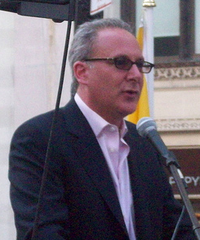Think of this as Volume 16, Number 13 of A-Clue.com, the online newsletter I've written since 1997. Enjoy.

There are always Cassandras out there, like Peter Schiff, convinced that the end is near. Every once in a while, as in 2007, they are right. Usually, they are wrong.
Some 35 years as a business reporter has convinced me that the market's main danger signal comes when people like Schiff are disdained or, worse, ignored. That's an indication that everyone is in the market and buying, that no one is considering possible trouble ahead and selling, so the next step is inevitably going to be a trip and fall.
Schiff's bearish call is based on Austrian school economics , the idea that government should have no role in the market, and that ultimately the only cure for excess is austerity. He blames government policies for the last crash, and believes all intervention since then assures another crash, this time based in lack of faith in government.
I disagree. I admit there is danger in continuing to run huge deficits. But growth provides a glide path toward balance, and moves toward balance reduce the ratio between GDP and total debt, as Fed chair Ben Bernanke says, and as we found in the 1990s. I think we're more likely at the start of something than the end.
Besides, technology is naturally deflationary, and deflation is a far greater danger to any economy than moderate inflation. Efficiency technologies create commodity deflation, just as Moore's Law created deflation in goods production and transport. The Austrian School not only defies Keynes, with no explanation for the growth of either the 1930s or the post-war era, but Moore as well.
But if Schiff's concerns were ignored, or dismissed, if there were no stories about ultra-bears sounding alarms, then I would be bearish. Because everyone was boosting Internet stocks in 1999. And everyone was telling us to buy housing in 2006. Anyone who disagreed – and I disagreed quite loudly in the first instance – was dismissed as a crank.
Ignoring warnings is a sure sign a market crash is near.

I think the new boom is based on manufacturing, on alternative energy technologies (starting with efficiency), and on scientific discoveries made possible by using the Internet to its fullest potential, connecting minds as well as data. I see growth accelerating as efficiency produces real pressure on energy prices, and I see nothing to stop the rise of alternative energy.
On the other side are two kinds of bears, those who base their call on rising energy prices, which I call the oil bulls, and those who reject Keynes and embrace austerity, like Schiff.
Oil bulls dismiss solar saying the technology can't improve, or can't scale. Yet we're now getting panels that produce both electricity and heat, panel mounting designs that capture all the Sun's light, and panel materials that are truly black and thus can absorb all light striking them. The problem of “solar panels don't produce on cloudy days” is going away. (Picture by Allegra Boverman for MIT.)
For monetary bears, like Schiff, the answer lies in growth. When borrowers get a return on their investment, banking becomes a virtuous cycle. Policies to pay for our past wars and eliminate tax cuts that don't generate revenue are now baked-into the system. Current deficit estimates are based on minimal growth, but lower input prices and higher output mean we can grow more.
This is no guarantee. Schiff may be right. The oil bulls may be right. I'm betting they're wrong, and I think I'll be right so long as there are people who listen to the bears' growl and act accordingly.
Please, do feel free to disagree.









